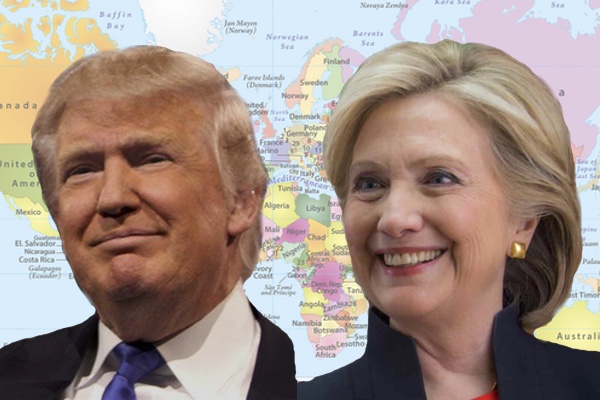This Election’s About Trade, Stupid!

So let's assume that Trump has won the election or narrowly lost it. In either case, it is a spectacular achievement for a candidate who spoke disparagingly about minorities, women and, not the least, free trade. Since 1945, free trade has been an article of faith for all presidential candidates, whether they were Democrat or Republican. Despite it all, Trump remains an incredibly popular candidate with a decent chance to be the next occupant of the oval office. Indeed, Trump's rise to political prominence dovetails with an age of rising nationalism, nativism and trade protectionism throughout the world. Democracy is in retreat in many countries including Russia, Turkey and South-Africa.
One of the most prevalent explanations for the Brexit vote and the rise of Trump is the fear of the white population both in the UK and the US of its declining demographic weight. This argument fails to explain why we are experiencing now the same political movements that we know from the 1930s. At that time, there were no significant demographic shifts in countries that exhibited the strongest tendency toward repressive, authoritarian regimes.
Another explanation proffered by experts is that the great majority of unskilled workers in developed countries, who lost their jobs because of the transfer of production lines to developing countries, are turning against the affluent and educated elites that benefitted from that process. But this explanation fails to account for the fact that "the median income for Trump supporters in the Republican primary was $72,000, about $10,000 more than the median income for whites in general." If it is not racial anxiety or poverty, what accounts for the ascendance of radical right?
We are experiencing today the same economic process that played out in the 1930s: a severe financial crisis causing international trade to decline. International trade that grew tremendously throughout the post-1945 era, has been increasing at an ever slower pace since 2008. This year, it has stopped growing and the latest data suggests that international trade is even contracting. The end result is that business owners who produce for the international market (hence internationalists) weaken while those that produce for the home market (isolationists) become stronger. Internationalist businesses are usually large corporations that specialize in hi-tech products; think Apple, Google but also General Electric and Coca-Cola. Isolationist companies are usually small to mid-size businesses that specialize in labor-intensive, low-tech goods; think dairy farmers, textile and processed food factories and real estate developers, yes, like Trump himself. In fact, Trump has adopted a policy proposal that calls for more tax breaks for real estate developers. Moreover, a poll that was taken in late September 2016, found that 60 percent of small business owners supported Trump.
Why are small businesses Trump-friendly? In a climate of slow recovery, small business owners are worried about competition from foreign-made goods. Unlike the big corporations, they cannot incur the legal expenses involved in employing undocumented immigrants. While the big corporations can use creative accounting to pay as little in taxes as possible, small business owners are far less financially savvy and chafe under the onus of one of the highest corporate tax rates in the developed world. Trump, with his anti-immigration, anti-China and low taxes policies, is the dream candidate for small, inward-looking business owners.
When international trade thrives, all this does not matter. Internationalist businesses are rich and powerful enough to use their resources to control the political process. But when international trade stagnates and contracts, isolationists may have the upper hand. Obviously, it helps that their grievances have an appeal among uneducated white workers who lost their jobs in recent years or found themselves working in several jobs at starvation wages.
Right now, the election is on a knife's edge. After the decades in which both candidates for the White House were internationalists, there is an even chance that an isolationist President will rule America. In the last few weeks, rather than deal with the core issue of this campaign – namely, trade – the Clinton campaign did all it could to focus voters' attention on the lurid aspects of Trump's personality. But as Election Day nears, voters' minds have been turning toward the concern that affects their lives the most. People who fear a loss of income due to trade with China, would vote for Trump, no matter how reprehensible his personal behavior. Hillary Clinton has consistently avoided offering policy-specific answers to the sectors of the American society that naturally sway toward an isolationist agenda. In doing so, Clinton forfeited an important opportunity. Even if, despite it all, Clinton wins this election, it would come with a slim majority and a reduced mandate.